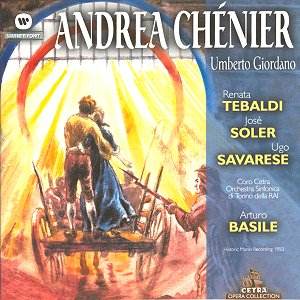All very strange. Not long ago I was commenting on
a 1952 Cetra set of Guglielmo Tell where the strident sound characteristic
of old Cetra LPs had been transferred unadulterated. Somebody’s obviously
taken a lot of trouble over this one. The bass is a little light but
the upper strings are brilliant without assuming a harsh glare, Giordano’s
often busy textures are remarkably analytical and the heavier passages
are surprisingly comfortable. Furthermore, the voices are not only firm
and clear (perhaps this at least could have been taken for granted)
but they mix in with the orchestra most realistically. Obviously a modern
recording will give you more detail, spread etc., but for a 1953 recording
this is about as good as they come.
Having praised the good work done here, I wish I could
tell you that the booklet was a mine of useful information, but it’s
not. We get a very brief presentation of the opera in Italian
and English, and the libretto in Italian. The booklet actually looks
quite substantial, but this is because, for every line that is sung,
the librettist, Luigi Illica, adds three or four lines of comment. We
do get photographs of Giordano, Illica, Tebaldi and Soler, but considering
that this sort of set is most likely to be bought by opera buffs, surely
what we really want is information about the singers whose names (with
one obvious exception) have rather receded into the mists of time. Hunting
around in Internet I can tell you that José Soler was born in
1904 and died in 1999, but that is all. His voice has, in certain notes,
an attractive freshness and he holds the high, strenuous lines without
apparent difficulty. However, in the middle range his quality is discontinuous
and the lower notes are weak. Furthermore, his phrasing is elementary
and there’s little characterisation. His most famous aria, "Come
un bel dì di maggio", pales before any number of favourite
versions and the final scene with Tebaldi seems not so much a duet as
a singing lesson, the great lady showing him how it has to go.
Ugo Savarese (1912-1997) left slightly more mark. Many
readers will know that he was the Germont on the Callas/Cetra set of
La Traviata, and this may not stand in his favour much since that was
a dreadful set from everybody except Callas. Here he is perhaps more
in his element and makes a good impression in his first scenes. When
his big Scarpia-like scene arrives, though, he goes in for some excessive
barking (as some Scarpias do) in an attempt to sound suitably malevolent.
I also have the idea that he is trying to compensate for a voice that
is not especially large, since he is more easily swamped by the orchestra
than the others. Still, it is an acceptable souvenir of a singer who
did useful work.
"Andrea Chénier" is an opera which
is unusually rich in smaller parts that all have something important
to do. The general level of the comprimari here is good; some
voices are more attractive than others but everybody is well aware of
what he has to do - as you would expect of Italians in an Italian opera
that was still a solid repertory piece at the time (it doesn’t come
up so often today).
As you will have imagined, all this is just clearing
the decks before saying that the real reason for bringing this set back
into circulation is Renata Tebaldi. Her career was already nine years
old in 1953 and in the end she chalked up 88 performances of this role
in the theatre. She also recorded it again in 1957 for Decca. Giordano
doesn’t give her anything very interesting to do in the first part of
the opera (the aria, if you call it that, "Eravate possente"
is musically undistinguished) and she is rather impatient with what
she has, but she comes fully into her own later on. If you compare her
in "La mamma morta" with Callas, for once comparisons all
go one way. Perhaps Tebaldi and Basile had the advantage that they were
performing in the context of the entire opera while Callas and Serafin
were recording a disc of arias. Be that as it may there are many lines
– compare them in "E Bersi, buona e pura, di sua bellezza ha fatto
un mercato, un contratto per me!" – when Tebaldi really gets into
the character while Callas just provides generalised expressiveness.
Tebaldi and Basile build the later stages of the aria more patiently,
fuelling its fires with a mystic glow where Callas fires her guns straight
off (just how much did she care for the piece, I wonder?), and providing
plenty of vocal thrills as the climax is reached.
The other big plus of the set is the conducting of
Arturo Basile. I admired his Tosca (Warner Fonit 8573 87479-2) and here,
too, he captures ideally the ebb and flow which gives life to this kind
of operatic writing. Hear him on his own in the charming chorus "O
pastorelle addio!" He knows just how to caress the music without
letting it sag.
So, get this for a fine, sometimes great, performance
by Tebaldi, splendidly conducted. The trouble is, in many ways this
is the tenor’s opera (he has more big scenes than the soprano) and,
given the inadequate tenor, buying this recording might end up a very
expensive way of buying "La mamma morta". The 1957 Decca doesn’t
appear to be available but, with a line-up of Tebaldi, Cossotto, Del
Monaco, Corena and Bastianini conducted by Gavazzeni, it sounds as if
it should be. The sets by Caballé/Pavarotti/Nucci/ Chailly (Decca)
and Scotto/Domingo/Milnes/ Levine (RCA), if available, are the obvious
modern contenders.
Christopher Howell


